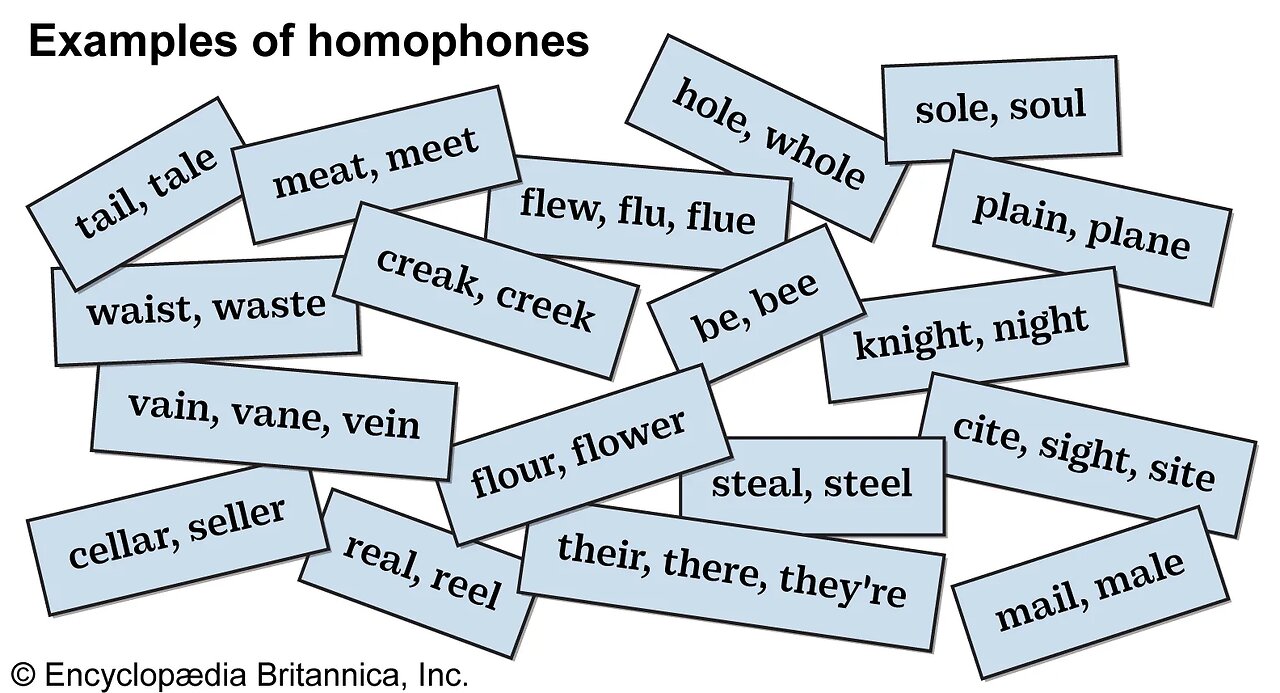Premium Only Content

TO vs. TOO vs. TWO: How-to Use : Homophones Made Easy: TO vs. TOO vs. TWO
TO vs. TOO vs. TWO: How-to Use : Homophones Made Easy: TO vs. TOO vs. TWO
Homophones are words in the English language that sound the same when spoken but have different meanings and often different spellings. They can be a bit tricky, especially for students learning English as a second language, but understanding them is important for clear communication. Here's a more detailed explanation:
1. Sound the Same: Homophones are words that are pronounced in the same way, or they have very similar pronunciations. This means that when you say them out loud, they sound identical, even though they may be spelled differently.
2. Different Meanings: Despite sounding the same, homophones have different meanings. Each word has its own unique definition and usage in sentences. This is why it's crucial to understand which homophone to use in a particular context to convey the intended meaning.
3. Different Spellings: Homophones are often spelled differently from each other. In some cases, the spelling may be quite similar, but there are usually subtle differences. These differences in spelling are what distinguish one homophone from another.
4. Common Examples: Homophones are common in the English language. Some well-known examples include "there," "their," and "they're," which all sound the same but have different meanings and spellings.
5. Context Matters: To choose the correct homophone in a sentence, you need to consider the context or the words around it. Understanding the context helps you determine which homophone is appropriate to convey the intended message.
6. Practice is Key: Learning homophones can be challenging, but with practice and exposure to the language, you can become proficient at using them correctly. Reading, listening, and speaking in English are all helpful ways to improve your understanding of homophones.
7. Common Homophones: There are many sets of homophones in English, such as "to," "too," and "two," "its" and "it's," "your" and "you're," "where" and "wear," and many more. Each set has distinct meanings and uses.
8. Clear Communication: Understanding and using homophones correctly is essential for clear and effective communication in English. Using the wrong homophone in a sentence can lead to misunderstandings, so it's important to pay attention to these words.
In summary, homophones are words in English that sound the same but have different meanings and spellings. Learning to distinguish and use them correctly is an important aspect of improving your English language skills, especially for those studying English as a second language. Practice and exposure to the language will help you become more confident in using homophones in your writing and speaking.
-
 13:09
13:09
Forrest Galante
10 hours agoWildlife Expert Reacts To Deadly Australian Animal TikToks
53.5K5 -
 12:08
12:08
Zoufry
2 days agoThe Mystery of Gaddafi's Final 24 Hours
14.7K11 -
 18:25
18:25
Liberty Hangout
13 days agoAnti-Ice Demonstrators Love Poop!
52.4K68 -
 9:39
9:39
MattMorseTV
16 hours ago $1.14 earnedVance just DROPPED a BOMBSHELL.
40.2K65 -
 23:47
23:47
GritsGG
1 day agoThe Forgotten Best Sniper Support AR!
19.2K3 -
 1:15:48
1:15:48
The Pascal Show
18 hours ago $0.12 earnedMUGSHOTS RELEASED! Emmanuel Haro's Parents Mugshot Released To The Public
14.8K1 -
 14:45
14:45
BlabberingCollector
21 hours agoKings Cross Station SET LEAKS! | Harry Potter HBO Show Update & News
13.7K1 -
 33:20
33:20
SB Mowing
9 days agoHealth Struggles + Endless Rain = A Yard Out of Control
21.5K19 -
 1:09:42
1:09:42
Mike Rowe
4 days agoHow Did THIS Dirty Job Make Tommy Mello A Billionaire?! | #447 | The Way I Heard It
79.6K20 -
 10:11:30
10:11:30
SpartakusLIVE
13 hours agoThe BADDEST Duo in WZ Exhibits PEAK Physique || Duos w/ Sophiesnazz to start, quads later
178K1